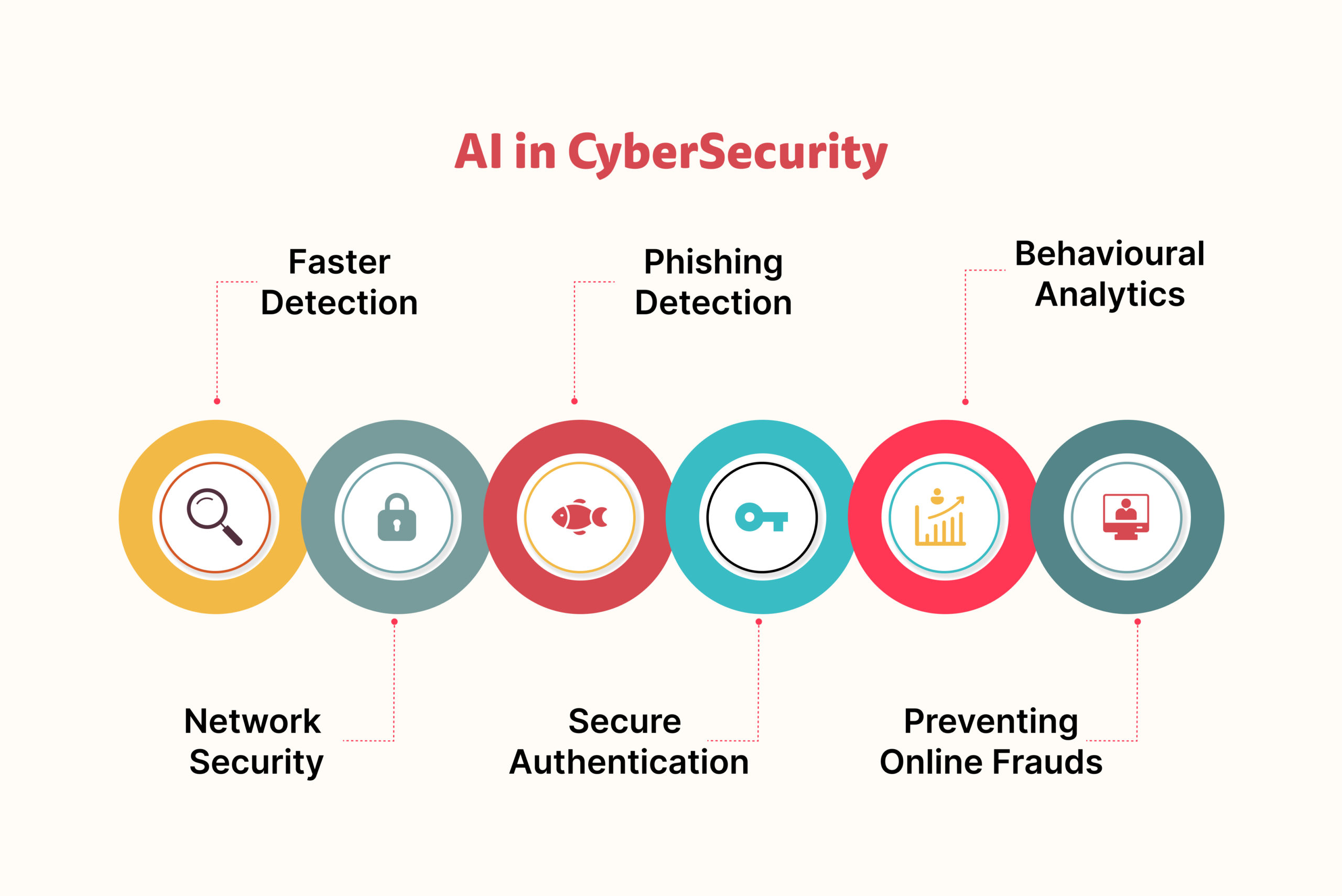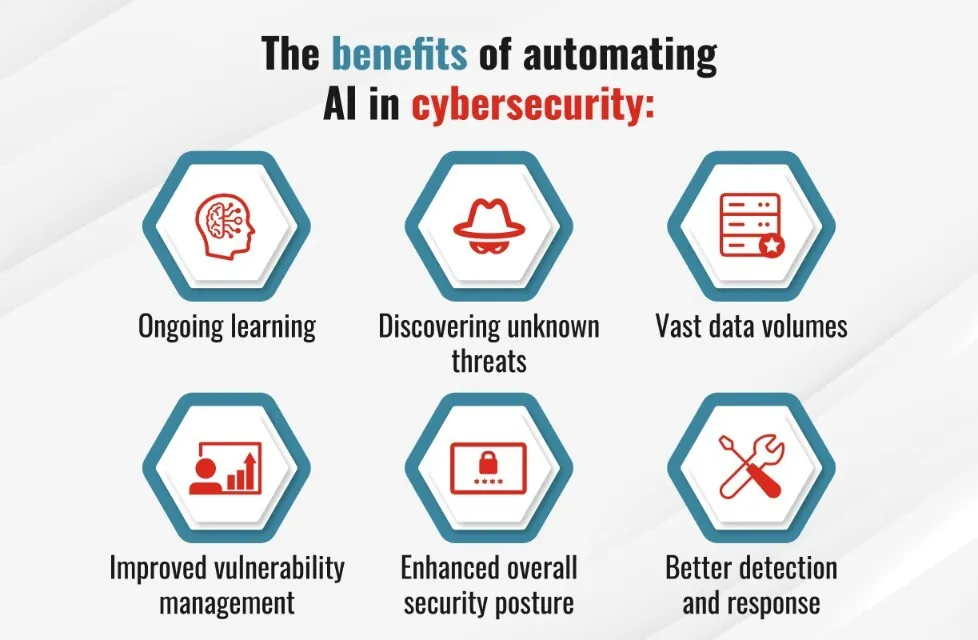The Role of Artificial Intelligence in Cybersecurity | How AI Enhances Protection
Jul 06, 2023
Artificial Intelligence (AI) has emerged as a key player in the field of cybersecurity, revolutionizing the way we protect and defend against cyber threats. With the increasing complexity and sophistication of cyberattacks, traditional security measures alone are no longer sufficient. AI brings a new level of intelligence and adaptability to the cybersecurity landscape, enabling organizations to detect, prevent, and respond to threats in real-time. In this article, we will explore the pivotal role of AI in cybersecurity and the advantages it offers in safeguarding our digital world.
Introduction: The Need for Advanced Cybersecurity
As our reliance on digital technologies grows, so does the need for robust cybersecurity measures. Cybercriminals are constantly evolving their tactics, making it imperative for organizations to stay one step ahead. AI presents a game-changing solution by leveraging its ability to analyze vast amounts of data, detect patterns, and learn from past experiences. By harnessing the power of AI, cybersecurity professionals can effectively combat the ever-evolving threat landscape.
Understanding Artificial Intelligence
Artificial Intelligence refers to the development of intelligent machines that can perform tasks requiring human-like intelligence. In the context of cybersecurity, AI algorithms are trained to identify anomalies, detect malicious activities, and make informed decisions based on the data they analyze. Machine Learning (ML) and Deep Learning (DL) techniques enable AI systems to continuously improve their performance and adapt to new threats.
AI-Powered Threat Detection and Prevention
Traditional cybersecurity solutions rely on predefined rules and signatures to detect known threats. However, these methods are often ineffective against emerging and previously unseen attacks. AI brings a paradigm shift by using advanced algorithms to identify anomalies and detect suspicious behaviors in real-time. By analyzing network traffic, user behavior, and system logs, AI systems can swiftly identify potential threats and take proactive measures to mitigate them.
Enhanced Network Security with AI
Network security is a critical aspect of cybersecurity. AI can play a vital role in enhancing network security by monitoring network traffic, detecting abnormal patterns, and identifying potential vulnerabilities. AI-powered systems can autonomously detect and block malicious activities, such as Distributed Denial of Service (DDoS) attacks, intrusion attempts, and unauthorized access attempts. This proactive approach helps organizations fortify their networks and prevent potential breaches.
AI-Driven Vulnerability Management
Managing vulnerabilities is a constant challenge for organizations. AI can assist in automating the process of vulnerability assessment and management. By scanning networks, systems, and applications, AI systems can identify vulnerabilities and prioritize them based on their severity. This enables security teams to focus their resources on addressing critical vulnerabilities and reducing the attack surface.
Automating Incident Response
Timely response is crucial in mitigating the impact of cybersecurity incidents. AI can automate incident response processes, allowing organizations to respond rapidly and effectively to attacks. AI systems can analyze and correlate data from various sources, identify the scope and severity of an incident, and initiate immediate remediation actions. This automation helps reduce response times and minimizes the potential damage caused by cyber threats.
Limitations and Challenges of AI in Cybersecurity
While AI offers significant benefits in cybersecurity, it is not without its limitations and challenges. One of the primary concerns is the potential for adversaries to manipulate AI systems and evade detection. Adversarial attacks can exploit vulnerabilities in AI algorithms, leading to false negatives or positives. Additionally, ensuring the transparency and explainability of AI decision-making processes is crucial for building trust in AI-powered security solutions.
Ethical Considerations in AI-Powered Security
As AI becomes more prevalent in cybersecurity, ethical considerations become paramount. The responsible and ethical use of AI is essential to prevent biases, discrimination, and privacy infringements. Organizations must ensure that AI systems are designed and deployed in a manner that respects user privacy, complies with regulations, and upholds ethical standards.
The Future of AI in Cybersecurity
The future of AI in cybersecurity is promising. AI algorithms will continue to evolve, becoming even more adept at detecting and responding to emerging threats. The integration of AI with other technologies like Internet of Things (IoT) and Big Data analytics will create a more comprehensive and proactive security ecosystem. Moreover, collaboration among cybersecurity professionals, researchers, and policymakers will be instrumental in harnessing the full potential of AI to protect our digital infrastructure.
Conclusion
Artificial Intelligence is revolutionizing the field of cybersecurity, empowering organizations to combat the ever-evolving threat landscape effectively. With its ability to detect anomalies, automate response processes, and enhance network security, AI is a game-changer in safeguarding our digital world. However, ethical considerations, transparency, and ongoing research and development are essential to ensure responsible and effective use of AI in cybersecurity.
Ready to up your computer vision game? Are you ready to harness the power of YOLO-NAS in your projects? Don't miss out on our upcoming YOLOv8 course, where we'll show you how to easily switch the model to YOLO-NAS using our Modular AS-One library. The course will also incorporate training so that you can maximize the benefits of this groundbreaking model. Sign up HERE to get notified when the course is available: https://www.augmentedstartups.com/YOLO+SignUp. Don't miss this opportunity to stay ahead of the curve and elevate your object detection skills! We are planning on launching this within weeks, instead of months because of AS-One, so get ready to elevate your skills and stay ahead of the curve!

FAQs
AI improves cybersecurity by analyzing large amounts of data, detecting anomalies and suspicious behaviors, automating incident response, and enhancing network security. It enables organizations to proactively identify and mitigate threats in real-time.
Some limitations of AI in cybersecurity include the potential for adversarial attacks, the need for explainable AI decision-making, and ethical considerations related to privacy and biases. Ongoing research and development are addressing these challenges.
AI cannot completely replace human cybersecurity professionals. It complements their work by automating routine tasks, detecting threats at scale, and assisting in decision-making. Human expertise is still crucial for strategic planning, policy development, and handling complex security incidents.
Organizations can ensure the ethical use of AI in cybersecurity by designing AI systems with privacy and fairness in mind, regularly auditing AI algorithms for biases, complying with regulations, and fostering a culture of responsible AI use within the organization.
The future of AI in cybersecurity is promising. AI algorithms will continue to advance, enabling more accurate threat detection and response. The integration of AI with other technologies and increased collaboration among stakeholders will drive innovation and strengthen our cyber defenses.
Stay connected with news and updates!
Join our newsletter to receive the latest news and updates from our team.
Don't worry, your information will not be shared.
We hate SPAM. We will never sell your information, for any reason.





![AI In Agriculture [NEW]](https://kajabi-storefronts-production.kajabi-cdn.com/kajabi-storefronts-production/file-uploads/themes/2153492442/settings_images/f3fdf8-e3fc-6bce-d26-2adc20ba5c0a_1e6bab8-d7b-d76c-e28c-fa6d513e45d_7138c16-f641-8fdf-e206-2bcac503bc5_AI_AGRI.webp)


